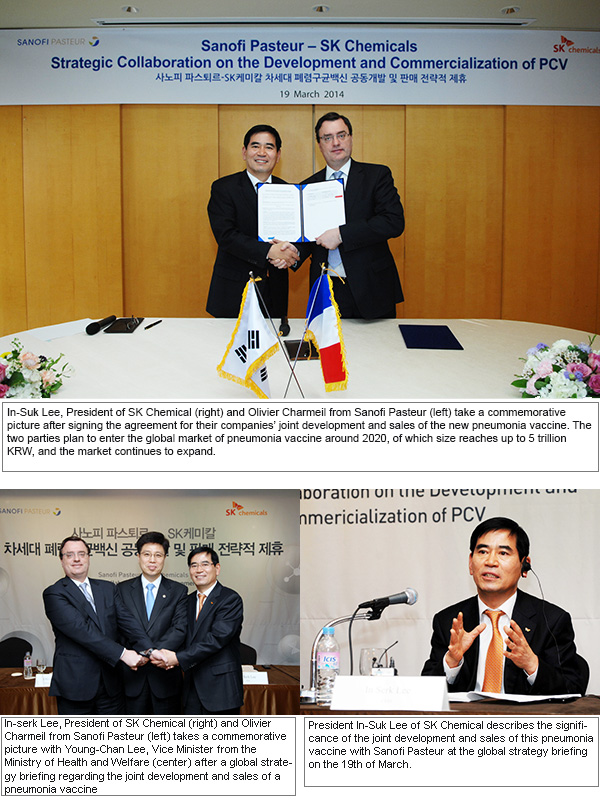● Sk Chemical and Sanofi Pasteur Joins Up for the Development and Sales of a Next-Gen Pneumococcal Pneumonia Vaccine
- SK Chemical’s technological capacity leads to a mega deal with the most prestigious
developer of vaccines
- 50 billion KRW (45 million USD) to be invested for the initial technological license and
major development processes - Profits to be shared
- Joint development to commence immediately for entry into global market sizing up more
than 5 trillion KRW on ASAP basis
- SK’s factory in Andong to supply whole quantity and grow into new global epicenter
of vaccine
- Localization of the production of a premium vaccine
SK Chemical (CEO In-Serk Lee) ventures into the global vaccine market by joining forces with one of the most prestigious vaccine developers in the world.
As of the 19th of March, SK Chemical has signed an agreement for joint development and sales of a next generation pneumococcal pneumonia vaccine with Sanofi Pasteur (Representative , Olivier Charmeil – “Sanofi” hereinafter), the global vaccine specialist.
The agreement involves investment of more than 50 billion KRW including major development processes and initial technological license fee, and it is also the first joint sales development agreement to be signed by a Korean pharmaceutical company and a global pharmaceutical powerhouse.
According to the agreement, SK Chemical will utilize its own technologies for developing the new vaccine in collaboration with Sanofi. The developed vaccine will be manufactured at the L HOUSE, which is its factory in Andong, to be supplied to Sanofi.
In the joint effort with SK Chemical, Sanofi will take charge of the clinical tests, certifications, and approvals around the world, as well as global marketing. The two parties will share the profits from this joint campaign.
The two companies expect that the new products can be commercialized around the year 2020.
The size of the global pneumonia vaccine market reaches up to 5 trillion KRW and has shown an average growth rate of 20% over the past 10 years (Source: World Medical Association , WMA 2012 Executive Summary - Market & Business Analysis).
In-serk Lee the CEO of SK Chemical, expressed his determination to take over the global vaccine market by saying, “This agreement represents the successful realization of SK Chemical’s mission and vision to enter the global market with vaccines manufactured at the best eco-friendly facility in Korea to protect people’s health. It will also serve as a foundation for localizing the production of essential preventive vaccines, based on national and government support.”
The vaccine products that are available on the Korean market have been mostly imported so far. As such, the necessity for domestic production has been raised. SK Chemical’s technological advantages may play a pivotal a role for Korea to emerge as one of the global vaccine players with its own premium vaccine products thanks to supportive policies from government departments such as Ministry of Trade, Industry, and Energy (Customized Production Support Project for Vaccine Materials); the Ministry of Health and Welfare (Global Market Entry Discussion Group for Vaccine Industry); the Ministry of Food and Drug Safety (Private and Public Joint Discussion Group for Commercializing Vaccine); and the Center for Disease Control. The local governments of Andong city and Gyeongsangbuk-do, where SK Chemical’s factory is located, also provided active administrative support.
SK Chemical is armed with a cutting-edge manufacturing facility in the Gyeongsangbuk-do Bio Industry Complex, which is located in Andong. It can supply 150 million doses per year, and is working on localizing the manufacturing process of vaccines with its own technology.

Sanofi Pasteur is the largest vaccine specialist in the world. It is the vaccine business division of Sanofi Group, which has more than 110 years of developing vaccines, and is also the largest supplier of the influenza vaccine. Its Korean branch was the first supplier of a formulated concentrate influenza vaccine on the Korean market in 1989, as well as for an injection vaccine for polio starting in 2002. Vaccines introduced by the Korean branch so far include an influenza vaccine (complete product); a hemophilus influenza type-B vaccine; a vaccine for pneumococcal pneumonia; a hepatitis A-virus vaccine; the first Tdap vaccine in Korea (diphtheria, tetanus, pertussis) for youth and adults; and a DTaP-IPV combo vaccine (diphtheria, tetanus, pertussis, polio) for children.
Under the vision of emerging as a leader in the healthcare industry, Sanofi Pasteur is working with Sanofi Aventis Korea (a pharmaceutical and consumer healthcare business) for ▲ introducing innovative and improved vaccines in Korea, ▲ expanding clinical research in Korea, and ▲ engaging in strategic partnerships and expanding the partnerships with Korean pharmaceutical companies. The company is expected to make an even bigger contribution to health and disease prevention by introducing a quadrivalent meningococcal vaccine and the vero-cell based live vaccine for Japanese encephalitis.
-------------------------------------------------------------------------------------
L House: SK Chemical’s factory in the Andong. It is equipped with a top-notch facility for manufacturing diverse premium vaccines. It also has a cell culturing facility that can deal with an inter-pandemic situation within 3 months after an outbreak by reducing the lead time the lead time by more than 50%, as compared to existing fertile egg manufacturing facilities. It is also the first pharmaceutical company in the world to be awarded LEED (Leadership in Energy and Environmental Design) certification, thereby, proving its realization of the corporate philosophy of SK Chemical.
Dose: The amount of vaccine required for 1 vaccination (oral or injection). The aforementioned annual manufacturing capacity of SK Chemical’s factory in the Andong area is based on the quantity of monovalent vaccine.